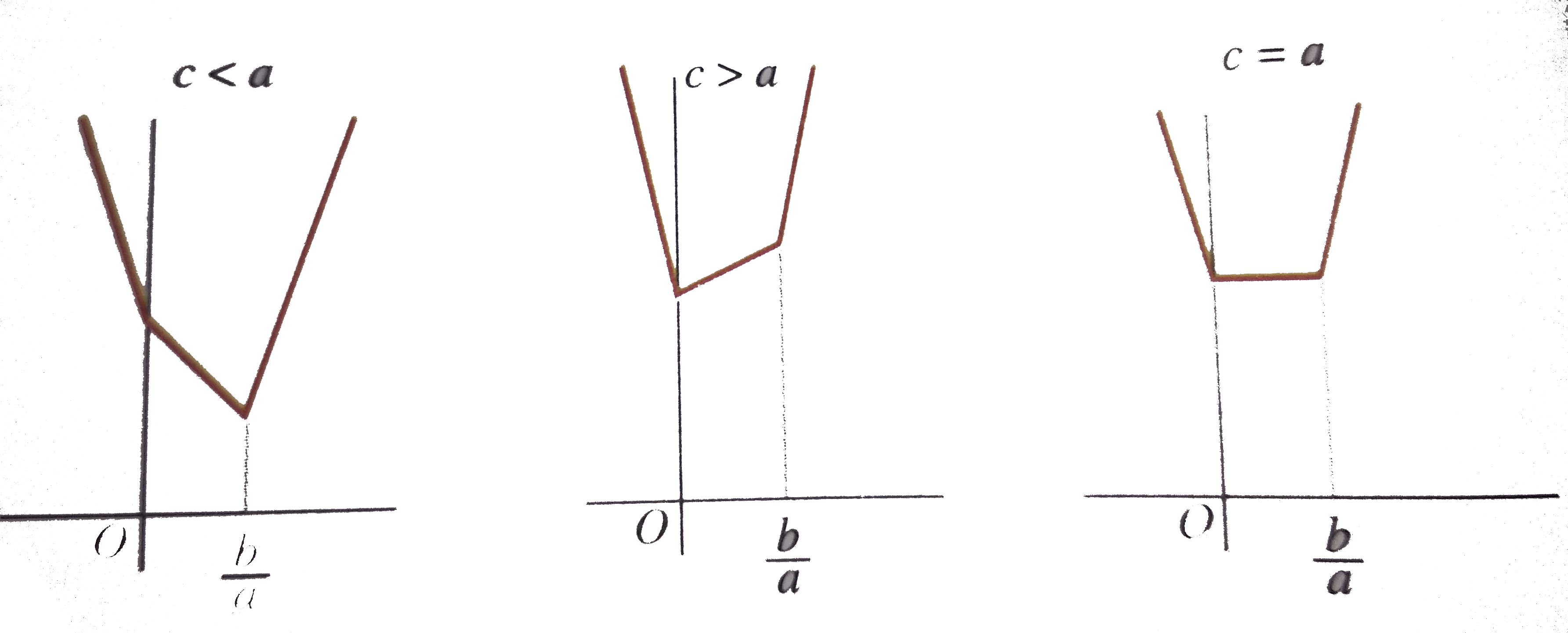f(x)=|ax−b|+c|x|∀x∈(−∞,∞), where a>0,b>0,c>0. Find the condition if f(x) attains the minimum value only at one point.
f(x)=⎧⎪
⎪⎨⎪
⎪⎩b−ax−cx,x<0b−ax+cx,0≤x<baax−b+cx,x≥ba
=⎧⎪
⎪⎨⎪
⎪⎩b−(a+c)x,x<0b+(c−a)x,0≤x<ba(a+c)x−b,x≥ba
The graphs of the function for different situations are as shown in the following figures.

From the figure, we can see that for c<aandc>a, there is only point of minima.
For c=a, there are infinite points of minima.
Thus, for exactly one point of minima, c≠a.
Topper's Solved these Questions
- GRAPHS OF ELEMENTARY FUNCTIONS BOOK - CENGAGE ENGLISHCHAPTER - GRAPHS OF ELEMENTARY FUNCTIONS EXERCISE - EXERCISES
34 Videos
- GRAPHS OF POLYNOMIAL AND RATIONAL FUNCTIONSBOOK - CENGAGE ENGLISHCHAPTER - GRAPHS OF POLYNOMIAL AND RATIONAL FUNCTIONSEXERCISE - Exercises
17 Videos
- GRAPHS OF TRIGONOMETRIC FUNCTIONSBOOK - CENGAGE ENGLISHCHAPTER - GRAPHS OF TRIGONOMETRIC FUNCTIONSEXERCISE - Exercises
22 Videos
Similar Questions
Let f(x)=a+b|x|+c|x|4 , where a, b, and c are real constants. Then, f(x) is differentiable at x=0 , if
View SolutionLet f(x)=a+b|x|+c|x|2, where a,b,c are real constants. The, f'(0) exists if
View SolutionLet f(x)=a+b|x|+c|x|4 , where a,bandc are real constants. Then, f(x) is differentiable at x=0, if a=0 (b) b=0 (c) c=0 (d) none of these
View SolutionAn LR circuit with a battery connected at t =0. Which of the following quantities will be zero just after the connection?
View SolutionLet f(x)=a2+bx+c where a ,b , c in Randa≠0. It is known that f(5)=−3f(2) and that 3 is a root of f(x)=0. Then find the other of f(x)=0.
View SolutionIf the range of the function f(x)=3x2+bx+c is [0,∞) then value of b23c is
View SolutionA differentiable function f(x) has a relative minimum at x=0. Then the function f=f(x)+ax+b has a relative minimum at x=0 for (a)all a and allb (b) all b if a=0 (c)all b>0 (d) all a>0
View SolutionIf for a function f(x),f′(a)=0,f''(a)=0,f'''(a)>0, then at x=a,f(x) has a (a) minimum value (b) maximum value (c)not an extreme point (d) extreme point
View SolutionA function f(x) having the following properties,
(i) f(x) is continuous except at x=3
(ii) f(x) is differentiable except at x=-2 and x=3
(iii) f(0)=0limx→3f(x)→−∞limx→∞f(x)=3,limx→∞f(x)=0
(iv) f'(x)>0∀∈(−∞,−2)∪(3,∞) and f'(x)≤0∀x∈(−2,3)
(v) f''(x)>0∀x∈(−∞,−2)∪(−2,0) and f''(x)<0∀x∈(0,3)∪(3,∞)
Then answer the following questions
Find the Maximum possible number of solutions of f(x)=|x|
View SolutionLet f(x)<0∀x∈(−∞,0)andf(x)>0∀x∈(0,∞) also f(0)=0, Again f'(x)<0∀x∈(−∞,−1)andf'(x)>0∀x∈(−1,∞) also f'(−1)=0 given limx→−∞f(x)=0andlimx→∞f(x)=∞ and function is twice differentiable.
The minimum number of points where f'(x) is zero is: (a) 1 (b) 2 (c) 3 (d) 4
View Solution
